Christine Blasey Ford's Testimony—Here's Everything You Should Know
In case you've been (understandably) avoiding the news cycle.
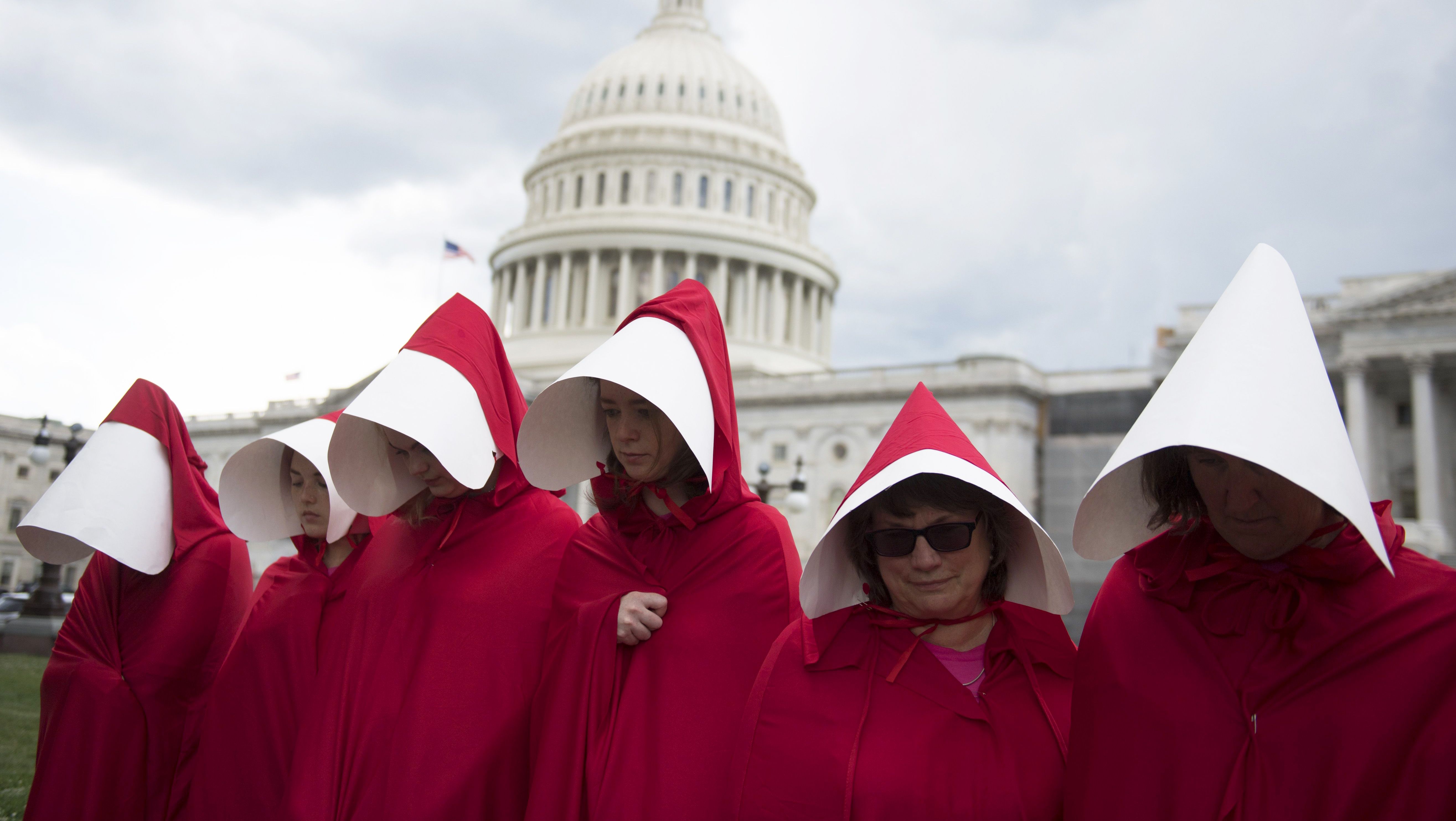
On Thursday, September 27, Dr. Christine Blasey Ford will testify before the Senate Judiciary Committee about allegations of sexual misconduct against Supreme Court nominee Brett Kavanaugh. Brett Kavanaugh will also be questioned on Thursday about the allegations. It’s a really, really big deal.
Dr. Ford's hearing is historic for a few reasons. First, we've only read interviews with her so far, and hearing her story from her own voice will add more context to her harrowing allegations. Not only that, but the ways these testimonies are interpreted—and the ways Kavanaugh’s supporters in Congress are trying to paint these allegations—suggests that how Dr. Ford presents herself on Thursday could mean the difference between the committee believing her account or casting it aside.
We've seen an all-male group of legislators decide not to believe a woman’s experience before. Never mind that Dr. Ford took a lie detector test, allowed reporters to scour her therapist’s notebook for instances she referred to the alleged misconduct, and just Wednesday, presented four people to whom she talked about the experience before any of it was of public interest. Further, two more allegations have surfaced from other women who likely will not be given time to testify.
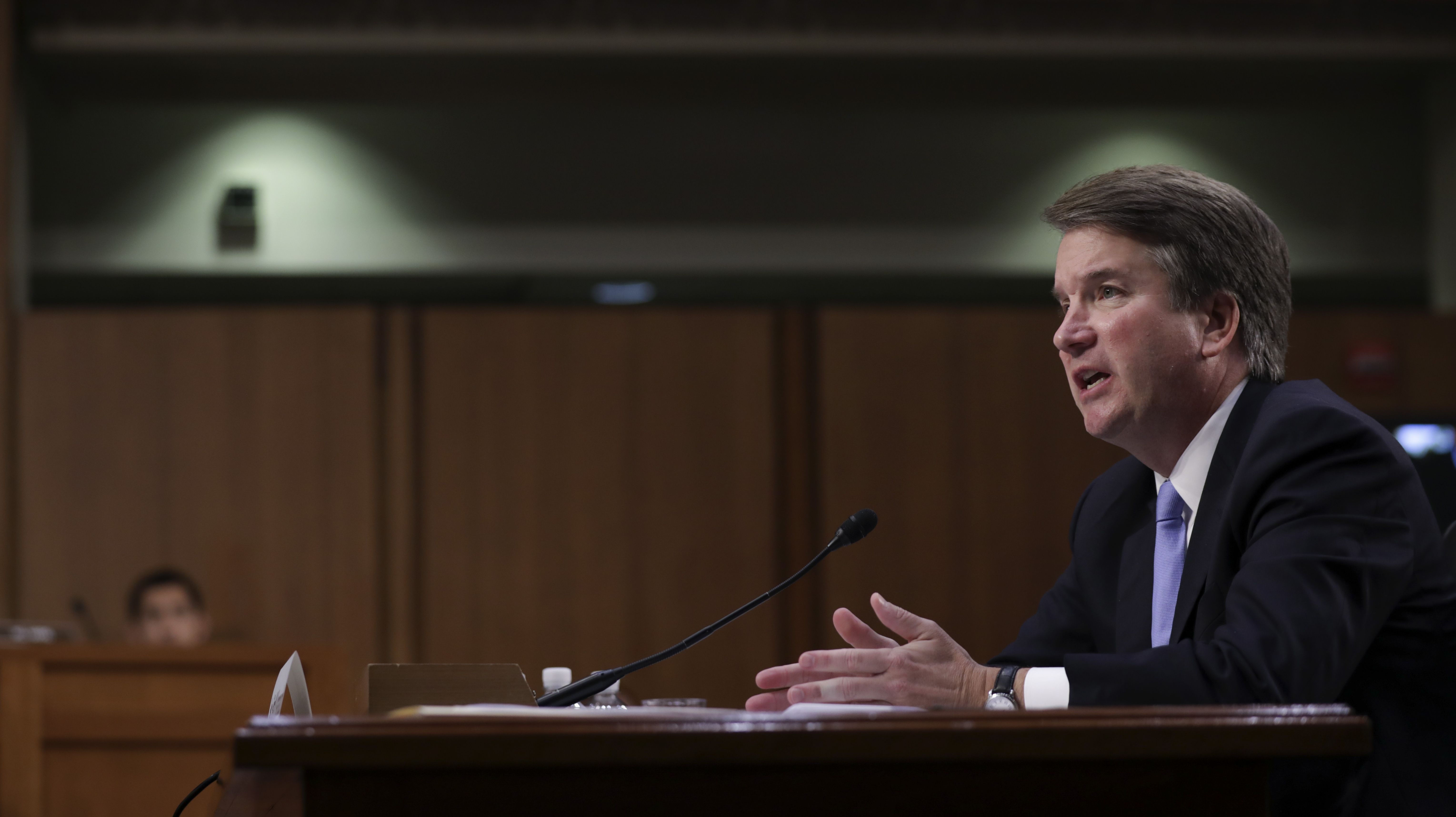
Brett Kavanaugh
But if the senators decide, for whatever reason, that Dr. Ford is not a compelling witness, none of that matters. And if it doesn’t matter, then a man credibly accused of sexual misconduct could be given a lifetime appointment to the highest court in the United States.
What Dr. Ford’s testimony will look like—and what it will lead to—is as yet unknown. Below is everything we know about Dr. Christine Blasey Ford’s Thursday testimony before it happens. We'll update as new information comes in.
Update: Dr. Ford took the stand a little after 10 a.m. on Thursday and delivered a powerful, harrowing account of the alleged assault. As though fighting back tears, she told the Senate Judiciary Committee that though she was "terrified" to be there, and had experienced her "worst fears" coming forward, she explained that she felt it was her civic duty to do so. Read more of the most powerful quotes from her statement here.
During questioning, Rachel Mitchell (representing Senate Republicans who yielded their time to her, see more below) acted like the prosecutor she is, which would be fine if Dr. Ford were on trial. But she isn't: This is a job interview for Brett Kavanaugh. Mitchell was also repeatedly cut off as the five minutes allotted to each Senator meant she could only talk to Dr. Ford in increments before someone else got to speak.
Get exclusive access to fashion and beauty trends, hot-off-the-press celebrity news, and more.
Equally strange, Mitchell's line of questioning touched on—among other things—Dr. Ford's alleged fear of flying despite repeated travel, her recollection about when she worked at Safeway as a high schooler, and whether she knew how to throw a polygraph test (the Washington Post piece cited below detailed that she had undergone a polygraph test that showed she was being truthful about her account). Though the optics didn't feature a group of all-male Senate Republicans volleying doubt-filled questions at her (as they did during Anita Hill's hearing 27 years ago), it also didn't look much better.
The hearing was emotionally wrenching, especially to those watching at home—many on social media vocalized their support for her. The hearing lasted a bit over four hours.
She was a perfectly compelling witness, easy to root for and highly believable (reportedly to the dismay of Donald Trump), but whether that convinces enough Republicans to deny Kavanaugh's confirmation is unclear.
What's the backstory?
Dr. Christine Blasey Ford came forward in a Washington Post interview last week as the woman who had confidentially accused Supreme Court nominee Brett Kavanaugh of sexual misconduct, stemming from an alleged incident back in high school. (There had been reporting that someone would come forward with something on Kavanaugh, but only when Dr. Ford agreed to an interview were the nature of these allegations confirmed.)
Dr. Ford claims that at a house party in the early '80s (when both Judge Kavanaugh and Dr. Ford were in high school), a very drunk Kavanaugh “corralled” her into a bedroom and forcibly held her down, groping her over her clothing while his friend, Mark Judge, looked on. During a tussle between the two men, Dr. Ford says she was able to get free and run from the room. Kavanaugh adamantly denies Dr. Ford's account, as does Judge.
Since then, another accuser, Deborah Ramirez, detailed new allegations to the New Yorker, and has said she is also willing to testify. She claims that Kavanaugh exposed himself to her when both were freshmen at Yale, which Kavanaugh also denies.
On Wednesday, a third woman named Julie Swetnick came forward through her lawyer, Michael Avenatti (also Stormy Daniels’ lawyer). In a sworn declaration, Swetnick alleges that she was the victim, at a party in high school, of being drugged and raped by “a train” of boys, and that both Kavanaugh and his friend Judge were present. She also claims she “became aware” of “efforts by Mark Judge, Brett Kavanaugh and others to ‘spike’ the ‘punch’ at house parties” with drugs or alcohol to “cause girls to lose their inhibitions.” Kavanaugh denies all of her allegations, as does Judge.
Below is my correspondence to Mr. Davis of moments ago, together with a sworn declaration from my client. We demand an immediate FBI investigation into the allegations. Under no circumstances should Brett Kavanaugh be confirmed absent a full and complete investigation. pic.twitter.com/QHbHBbbfbESeptember 26, 2018
What does Kavanaugh say about these allegations?
Regarding Dr. Ford’s allegations, Kavanaugh told Fox News, “What I know is the truth, and the truth is I’ve never sexually assaulted anyone.” He also told Fox News that he didn’t even lose his virginity until “many years” after high school.
In response to Ramirez’s allegations, Kavanaugh said, “The other people alleged to be there, don’t recall any such thing. If such a thing had happened, it would’ve been the talk of campus.”
And in response to Swetnick’s allegations, Kavanaugh said in a statement, “This is ridiculous and from The Twilight Zone...I don’t know who this is and this never happened.”
What does the President say?
President Trump said the accusations against Kavanaugh were “a con game being played by the Democrats.” He also cast doubt on Ramirez’s testimony, saying, “This is a person and this is a series of statements that is going to take one of the most talented intellects from a judicial standpoint in our country—keep him off the Supreme Court?”
He also attacked Avenatti (and his client by proxy) in a tweet Wednesday afternoon:
That said, later on Wednesday he opened the door to changing his mind about Kavanaugh:
BREAKING: Trump says he’s open to 'changing my mind' about Supreme Court pick if Kavanaugh hearing evidence is compelling.September 26, 2018
Just further proof that Thursday is a big deal.
Has this ever happened before?
Something similar has happened in a confirmation process, and that’s why Dr. Ford's testimony could be historic. In 1991, Professor Anita Hill testified to the Senate Judiciary Committee—which was then trying to confirm George H. W. Bush’s nominee, Clarence Thomas—that Thomas had allegedly made lewd comments of a sexual nature to her in the workplace.
Throughout her testimony, in front of an all-white, all-male committee, Professor Hill’s credibility was questioned, and she was grilled on every lascivious aspect of the alleged interactions over and over. She was also smeared with sexist remarks in the press, most famously when conservative writer David Brock called her “a little bit slutty and a little bit nutty.”
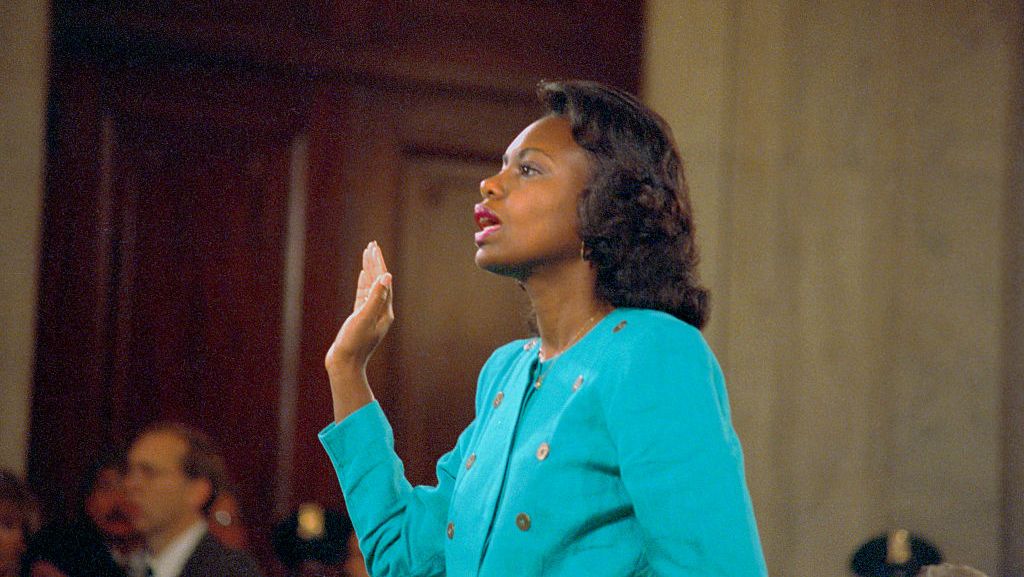
Anita Hill testifying in 1991.
Ultimately, Justice Thomas was confirmed, though the #MeToo movement has recast the entire incident in a new light. (Professor Hill is a participant of the #TimesUp movement.) Namely, many people wish Professor Hill's testimony had been taken more seriously. Hence why Dr. Ford's testimony could be seen as a way to right history's wrongs.
What’s different this time?
Well, for one thing, people actually liked Clarence Thomas. That might sound like an unnecessary dig, but public opinion actually holds weight when it comes to confirming a Supreme Court nominee.
Going into the nomination process, 52 percent of Americans supported Clarence Thomas’s confirmation—a number that actually rose after Anita Hill testified, according to FiveThirtyEight. Kavanaugh, meanwhile, saw only 41 percent approval back in July, before these accusations even came to light. That’s one of the lowest approval scores for a Supreme Court nominee ever.
We’ve also made progress as a nation, even when it doesn’t always feel like it. Just look at how the conversation around sexual misconduct has changed in even just the past few years. When Anita Hill testified, only 17 percent of Americans thought sexual harassment was a serious problem, according to the same FiveThirtyEight article. Now, 72 percent of Americans think it’s a serious problem. That’s a huge jump—made possible in part by Anita Hill’s bravery in testifying before the committee.
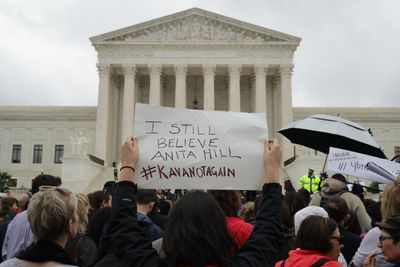
Who’s going to be asking questions?
The hearing is going to be a bit weird, given that someone that Mitch McConnell called “an assistant” has been hired to ask questions of Dr. Ford and Judge Kavanaugh.
The outside counsel is actually Rachel Mitchell, an attorney with many years of experience prosecuting sex crimes. She's also a woman, which is important for the GOP's purposes (more on that below).
Why hire an outsider to ask questions?
The answer depends on who you ask. Republicans like Mitch McConnell said Mitchell was brought on “to ask these questions in a respectful and professional way. We want this hearing to be handled very professionally, not a political sideshow.”
Republican Committee Chairman Senator Chuck Grassley, of Iowa, said, "The goal is to de-politicize the process and get to the truth, instead of grandstanding and giving senators an opportunity to launch their presidential campaigns.” Which, fair. Do you really want to hear Ted Cruz ask a woman questions of a sensitive nature?
RELATED STORY
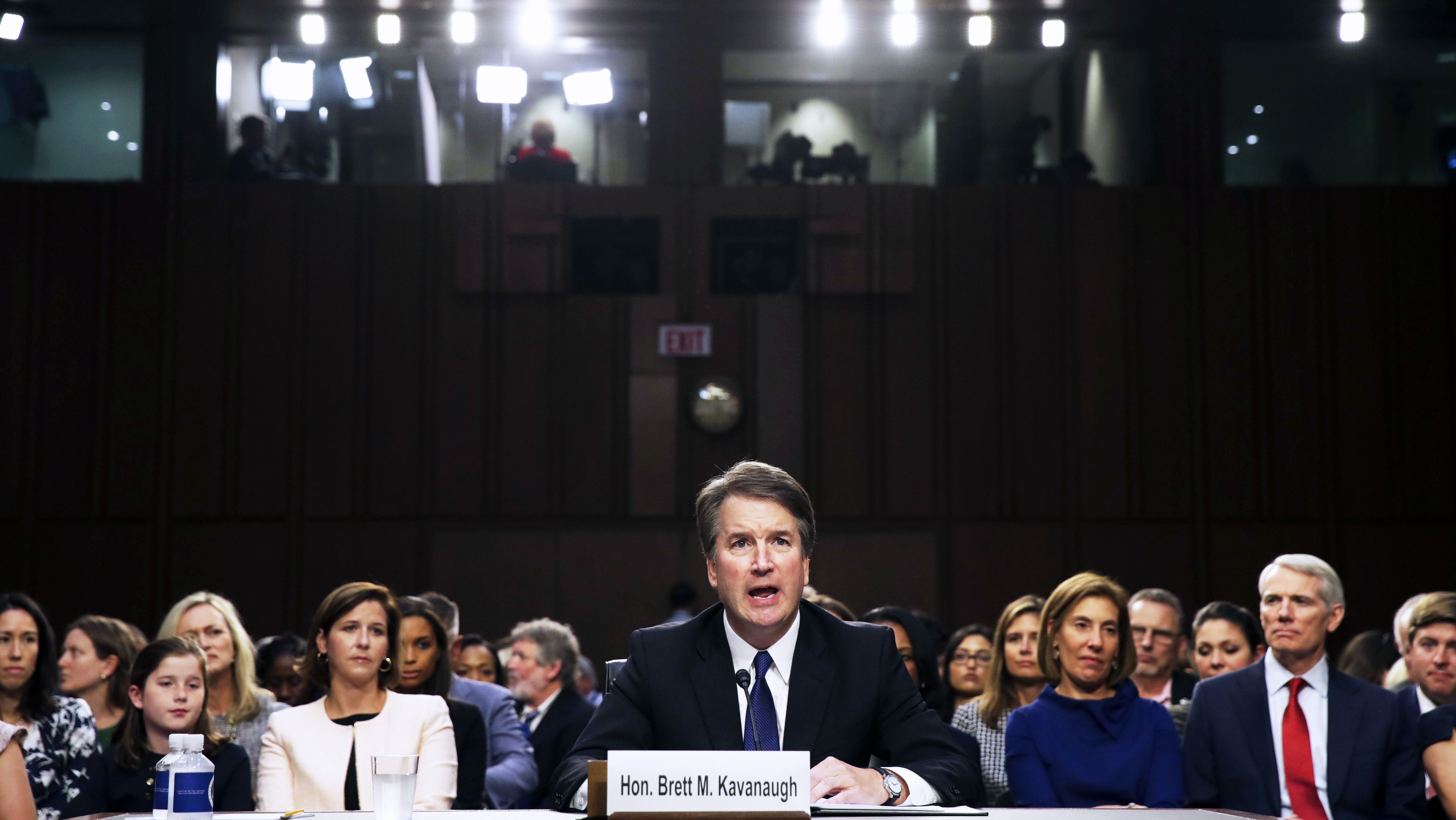
But Democrats and opponents of Kavanaugh’s nomination point out that this move is just to manipulate the optics of the committee—a group of white men who would be questioning a woman about her own experience and, like during Hill's testimony, trying to cast doubt on it. Except, unlike Hill's testimony, they'd be doing this in the #MeToo era. (It’s worth noting that support for Anita Hill went up considerably in the months following her testimony.)
Wanting to change those optics makes sense: Orrin Hatch questioned Hill and is still on the same committee 27 years later. That’s not a great look if Kavanaugh’s backers are trying to show that the experiences of Professor Hill and Dr. Ford are notably different.
Personally? I think this forced changing of optics might be a good sign. It means that the conversation around sexual harassment has progressed at least enough for a group of white Republican men to understand that they'd look very bad questioning Dr. Ford themselves—a qualm they didn't have during Professor Hill's testimony. That's technically progress, right?
How will this affect Kavanaugh’s nomination?
Democratic Senators are already calling for Kavanaugh’s nomination to be withdrawn before Dr. Ford even takes the stand:
There are three women willing to testify under oath about credible allegations. The GOP continues to refuse to call for an FBI investigation. It is time for Judge Kavanaugh’s nomination to be immediately withdrawn. Enough is enough.September 26, 2018
Though we won’t know what will happen until we see how the testimony goes, GOP Senators are steadfast in their belief that they’ll get Kavanaugh confirmed. “We're going to be moving forward. I'm confident we're going to win. I'm confident he will be confirmed in the very near future,” Senator Mitch McConnell told press on Tuesday.
For what it’s worth, the GOP needs all of their senators to vote in lockstep in order to push Kavanaugh confirmation through. And with Senator Susan Collins of Maine, Senator Lisa Murkowski of Alaska, and Senator Bob Corker of Tennessee all expressing hesitation, that could spell trouble for Kavanaugh. But all three of them have said they’d clear their calendars to watch Dr. Ford’s testimony, according to NBC News, which means the confirmation could actually hinge on what happens Thursday morning.
What happens if Kavanaugh’s nomination is blocked?
We’d move onto another Trump nominee, although if it happens after the midterm election—particularly if the midterm election is the “Blue Wave” some are speculating it will be—that person will be under intense scrutiny as well, with an even more uphill battle for confirmation should Democrats control the Senate.
If you want to guess who that new person might be, the White House released a list of 25 names of potential Supreme Court nominees back in November of 2017. (Brett Kavanaugh’s name was on it.) It’s unwise to assume we know what this president will do at any time, but there’s a good chance the next nominee will be pulled from that list.
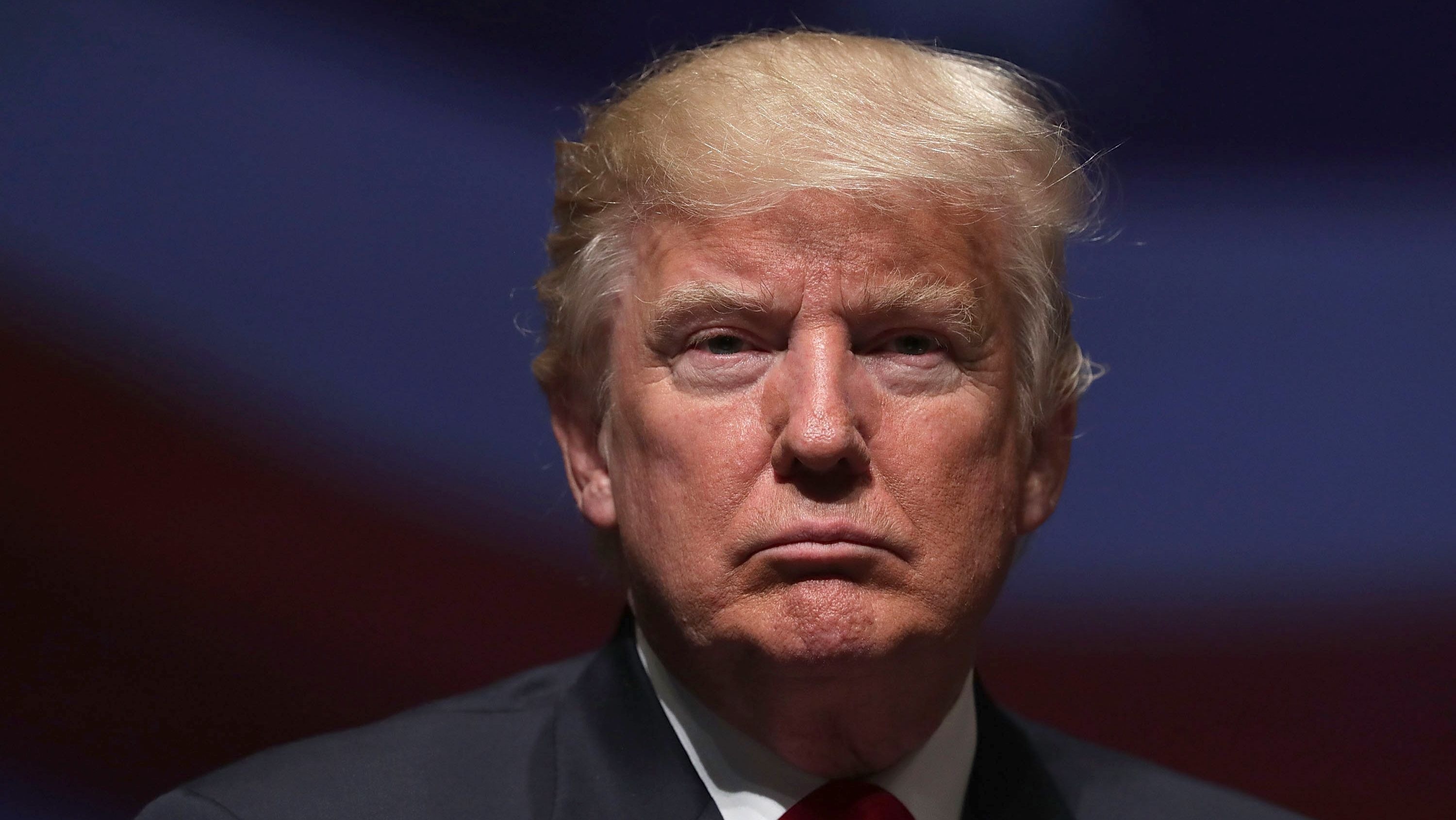
When will we find out whether Kavanaugh is confirmed?
The Senate Judicial Committee has scheduled the vote on Kavanaugh’s confirmation for the day after Dr. Ford’s testimony. Critics of the move claim that it was done to make sure Ramirez (and now, potentially other accusers) would be unable to testify, but Senator Grassley said the vote would only take place “if we’re ready to vote. If we aren’t, we won’t vote.”
After the vote in committee, it’ll go to the Senate, where those key Republicans on the fence will have to actually figure out how they feel about this. After that, there will be room for debate, followed by a final vote in the Senate.
So we could know whether Kavanaugh is confirmed by early next week.
Christine Blasey Ford's testimony will take place at 10 a.m. EST on Thursday, September 27. Watch it on C-SPAN here.
Cady has been a writer and editor in Brooklyn for about 10 years. While her earlier career focused primarily on culture and music, her stories—both those she edited and those she wrote—over the last few years have tended to focus on environmentalism, reproductive rights, and feminist issues. She primarily contributes as a freelancer journalist on these subjects while pursuing her degrees. She held staff positions working in both print and online media, at Rolling Stone and Newsweek, and continued this work as a senior editor, first at Glamour until 2018, and then at Marie Claire magazine. She received her Master's in Environmental Conservation Education at New York University in 2021, and is now working toward her JF and Environmental Law Certificate at Elisabeth Haub School of Law in White Plains.